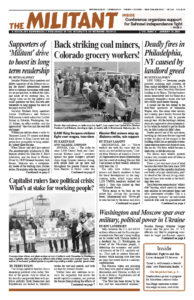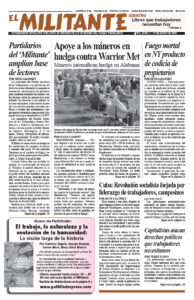“Israel was born as a Jewish state. And that was the decision of the Jewish people,” Mansour Abbas, a leader of Ra’am — the United Arab List party — and member of Israel’s Knesset, told the press Dec. 21. “It was born that way and that is how it will remain.”
His remarks ignited a wide discussion and debate in Israel and the Middle East. This is the first time a Palestinian official inside or outside Israel has recognized Israel’s right to exist as a Jewish state.
“The question is not about the state’s identity, but what the status of Arab citizens will be in it,” Abbas added, during an interview held in Hebrew. He made similar statements in Arabic the month before, which were printed in the Nazareth-based Kul al-Arab.
“We [Arabs] have to decide whether we want to engage in campaigns that have a chance of succeeding — and then we’ll be able to develop as a society and prosper, and be an influential sector of society — or whether we want to be in an isolationist position and continue to talk about all these things for another 100 years,” Abbas said.
Ra’am was formed in 1996 by a coalition of the southern branch of the Islamic Movement in Israel and several Bedouin parties, winning seats to the Knesset in every election since. In the 2020 elections it was part of the Joint List, an electoral coalition with three other predominantly Arab parties, which won 18 seats. In the 2021 elections Ra’am split from the Joint List, winning four seats itself.
Ra’am campaigned on solving issues facing Arab citizens of Israel — who make up 20% of the country’s population — to improve their quality of life, including a severe housing shortage and lack of schools.
Then in a move that shocked his former allies, Ra’am agreed to become part of the new governing coalition, joining seven other bourgeois parties in electing Naftali Bennett as prime minister. This is the first time in 50 years that an Arab party in Israel has been part of the ruling coalition.
After Ra’am joined the government, a leader of Balad, one of the parties in the Joint List, said Abbas was now an “outcast.” Despite the attacks by “left” groups in Israel’s Arab community and by supporters of Hamas, the Islamist leader’s course is popular among many Palestinians.
A new generation
“There’s a young generation here,” said Mohammad Magadli, a journalist for Israel’s Channel 12, that “isn’t willing to be second-class citizens. But it’s also a generation that wants to integrate into society, so they vote for Mansour Abbas.”
The statements by Abbas urging acceptance of Israel as a Jewish state continue the advance represented by the establishment of diplomatic relations with Israel in the last year of the Donald Trump administration by the governments of the United Arab Emirates, Sudan, Morocco, Bahrain and Kosova.
These developments open the doors to working people in Israel and across the Middle East finding ways to join together to defend their class interests against assaults on their rights and living standards by all the capitalist governments in the region.
Improvements in the lives of working people in Israel — and the ability of workers there to unite and fight for a government of workers and farmers, whatever their nationality or religious views — will be settled in struggle, just as it will in other capitalist countries.
The existence — and the necessity — of the state of Israel as a refuge for Jews was settled by the gruesome history of capitalism and Jew-hatred in the 20th century. It became inevitable after the Nazis’ extermination of 6 million Jews during World War II. This was coupled with the refusal of the imperialist governments of the U.S., U.K. and other countries to open their borders to Jews fleeing persecution — before, during and after the war. Another factor was the absence of a working-class leadership in Palestine that could unite Arab and Jewish workers in common struggle. Israel was established in 1948.
In 2020 Abbas eulogized victims of the Holocaust, the first Arab member of the Knesset to do so. “I have empathy for the pain and suffering over the years of Holocaust survivors and the families of the murdered,” he told the Knesset. He called Holocaust denial a “betrayal of the values of truth and justice … a fundamental principle in Islam.”

